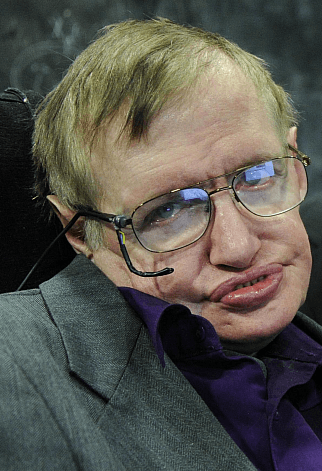-2.jpg) By Thomas HornigoldMar 14 2018
By Thomas HornigoldMar 14 2018Physics lost an extraordinary individual today when Stephen Hawking, world-renowned cosmologist, theoretical physicist, and science communicator, died at the age of 76. Although he was only given a few years to live when first diagnosed with motor-neurone disease in 1963, he defied medical predictions and lived for another fifty years.
He is best remembered for his contributions to cosmology, especially around the physics of singularities and black holes. Black holes – regions of space and time where the gravitational field is so strong that nothing, not even light, can escape – have been theorized since the early 20th century.

They are one of the most simple permissible solutions to Einstein’s general relativity field equations; Schwarzschild found this mathematical solution in 1916, the year after Einstein first published his field equations that describe the nature of gravity. It took another forty years, until 1958, for a more modern interpretation of what this mathematical solution meant: a black hole.
A black hole is a finite region of space; the Schwarzschild radius can be calculated by the fairly simple formula R = 2GM/c2. The region of space-time inside this radius – perhaps infinitely warped – was considered one of the most mysterious places in the Universe: especially as, since nothing could escape the event horizon, the contents were unknown.
Hawking’s first breakthrough – working with the mathematician Roger Penrose – was to demonstrate that there may be “singularities” at the heart of black holes. There is a region of space-time where the curvature due to gravity is infinite (a time-like singularity), or else a region where some finite amount of matter is compressed to a single point (a space-like singularity, or a point of infinite density.) Hawking’s original theory suggested an intimate link between singularities and cosmology; he suggested in his Ph.D. thesis that the Universe may have begun as a singularity. (He later decided and mentioned in A Brief History of Time, that this was contradicted by quantum mechanics.)
It was this intimate link between black holes and cosmology that is perhaps the hallmark of Hawking’s work. In realizing that the mathematics of general relativity and the evolution of a singularity could be applied as a model for the Universe – only in reverse – Hawking and Penrose obtained profound insights into the history of the Universe.
When Hawking’s career began, there was still considerable debate over whether the Universe was expanding, contracting or steady-state. Einstein, whose theory had implied the possibility of a universe that changed in time, was uncomfortable with the implication that gravity should cause the Universe to collapse; so much so that he added his famous “cosmological constant” to balance out the collapsing influence of gravity. By Hawking’s day, it was accepted that the Universe was expanding, but debate remained about how to reconcile theory with observation. The existence of singularities, which Penrose and Hawking mathematically demonstrated, implied that there are points in the Universe where the laws of physics as we know them, cannot be applied.
For matter on the scale of that singularity, quantum mechanical effects should become more important and dominating. Surrounding a region of infinite density, the gravitational effects and general relativity should also be vital. But, famously, the great unsolved problem of theoretical physics in the last century is finding a theory that unifies general relativity and quantum mechanics. It is this effort to which Hawking would devote much of the rest of his career – and, despite numerous candidates like loop quantum gravity, string-theory and M-theory that could solve the problem, no theory has been completely accepted.
 Image credit: REDPIXEL.PL/Shutterstock
Image credit: REDPIXEL.PL/Shutterstock
Hawking would continue for the rest of his career to look at the potential for finding this ultimate theory – the Theory of Everything – through analysis of black holes. After all, they were regions of space where the two apparently contradictory theories ran headlong into each other: the perfect place to look for such contradictions.
His next great breakthrough came in 1974. He had attempted to apply the laws of thermodynamics and energy conservation to black holes; they held everywhere else, so why not there? In doing so, in collaboration with others, he discovered that even black holes were not a steady-state solution for matter in the Universe: they must gradually emit radiation and evaporate.
The average black hole is so cold that this radiation is unlikely to be experimentally visible – at least, not from the black holes we’ve discovered, where it’s swamped by radiation from the surrounding in-falling material. This is described by saying that close to the event horizon, particle-antiparticle pairs are continuously formed; one half of them spirals into the black hole, while the other half is freed and emitted as radiation. In an alternative description, particle-antiparticle pairs form just inside the black hole, but one of them can escape due to quantum tunneling. Although a black hole of just the mass of the Sun will live for 1073 years, the fact that they do gradually shrink and evaporate has profound consequences for the long-term fate of the Universe.
Hawking was not always right. He conceded that his long-held belief that information was lost in black holes (the ‘information paradox’) was probably wrong, in one of his famous scientific bets, in the 1990s. Another bet he lost was in betting that the Higgs Boson would never be discovered; when it was found in 2013, he immediately conceded and opined that Higgs should be awarded the Nobel Prize.
His book, A Brief History of Time, released in 1988, became a best-seller, introducing more than ten million readers to concepts in fundamental physics – including some that Hawking discovered himself. Amongst his academic achievements – the litany is too long to list – he became Lucasian Professor of Mathematics at Cambridge, and so followed in the footsteps of Isaac Newton and Paul Dirac as one of the greatest English physicists.
In his later years, as one of the most iconic physicists and communicators of science ever to have lived, Hawking brought the ideas of fundamental physics to a wide audience. He has spoken eloquently on issues such as the treatment of people with disabilities, the long-term future of humanity, and UK politics.
This article has been mostly about his scientific legacy, but the mere fact that he was able to live such a productive life, overcoming the immense challenge of being almost entirely paralyzed in later years, has been an inspiration to millions of people and challenged stereotypes about disability. He arguably turned his disability into an advantage, becoming a uniquely iconic figure with perhaps one of the most famous voices on the planet – an artificial one that nevertheless spoke with great warmth and eloquence to the scientific community and the general public.
In the long run, his greatest legacy is likely to be the generation of people he inspired to pursue physics and the endless pursuit of fundamental truths about the Universe. That voice will be missed in the modern world.
Image credit: https://commons.wikimedia.org/wiki/File:Stephen_Hawking_2013.png
Disclaimer: The views expressed here are those of the author expressed in their private capacity and do not necessarily represent the views of AZoM.com Limited T/A AZoNetwork the owner and operator of this website. This disclaimer forms part of the Terms and conditions of use of this website.